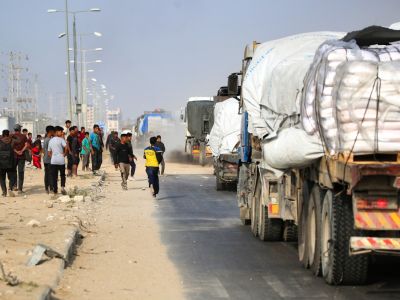Jordan's Prime Minister Ali Abu Ragheb flew in Wednesday with four ministers, becoming the first Arab head of government to visit Baghdad since the 1991 Gulf War and further easing Iraq's isolation.
Accompanied by about 100 people, including the ministers of information, energy, transport and health, along with journalists, he arrived at Saddam International airport on a Royal Jordanian plane.
"This (two-day) visit seeks to boost bilateral relations in the political, economic and social fields," Abu Ragheb said on his arrival, which came on the opening day of the Baghdad international trade fair.
Quoted by the official INA news agency, he said he wanted to "solidify Jordan's efforts for a lifting of the embargo and establish brotherly and complementary relations to make it the core of Arab solidarity and common Arab action."
Vice President Taha Yassin Ramadan, who headed the Iraqi welcoming committee at the airport, hailed the visit as "an important and fundamental step on the good path to establish solid relations between the two countries."
The Jordanian premier added that he was carrying a message from King Abdullah II to Iraqi President Saddam Hussein, the contents of which he did not disclose.
At the same time, a message going the other way, thanking Jordan for "its efforts to end the suffering of Iraq and put an end to the suffering of its people", was delivered to King Abdullah in Amman by visiting Iraqi Foreign Minister Mohammad Said al-Sahhaf, Jordan's Petra news agency said.
In Baghdad, Abu Ragheb will head a meeting of the two countries' joint commission, which has not convened since 1989, and will meet with Saddam, Jordanian officials said.
Abu Ragheb's visit was "witness to the beginning of a new stage in political and economic relations between Jordan and Iraq," an Arab diplomat in Baghdad told AFP.
Jordan's Energy Minister Wael Sabri said a major topic in discussions will be the renewal of an oil agreement between the two countries for 2001, saying Jordan and Iraq had not yet examined prices for the deal.
Jordan depends on Iraq for all its oil and under a UN-approved agreement is importing 4.8 million tons of Iraqi crude in 2000 at preferential rates in exchange for 300 million dollars worth of goods to be exported.
The kingdom expects its oil needs to go up to five million tons for next year.
Sabri also told reporters Iraq and Jordan will look at ways to finance a 750-kilometer (450-mile) oil pipeline connecting the Iraqi city of Haditha with a refinery near Amman.
The project is expected to cost around 350 million dollars. Until now Iraqi oil has been sent to Jordan in tanker trucks.
Jordan was one of the few Arab countries sympathetic to Baghdad during the 1991 Gulf conflict, but relations plummeted in the mid-1990s as Jordan, which also has good ties with the United States, hosted Iraqi dissidents on its soil.
Relations have been improving since July, when the Vice President visited Amman.
Last month Abu Ragheb called on British insurers Lloyd's to halt its inspections of Iraq-bound imports at the Jordanian port of Aqaba, in a decision hailed by Baghdad.
On September 27 Jordan became the first Arab country to defy the 10-year-old UN air ban imposed on Iraq when it flew a humanitarian plane to Baghdad.
Iraq wants commercial airlines to resume regular service between Baghdad and Amman, arguing that no UN resolution prohibits such flights.
Asked by AFP about the flights, Abu Ragheb said in Amman: "This matter will be done in an institutional manner and we shall strive to do it through the United Nations."
Jordan filed an official request to the UN in September for a resumption of Baghdad-Amman flights -- BAGHDAD (AFP)
© 2000 Al Bawaba (www.albawaba.com)









